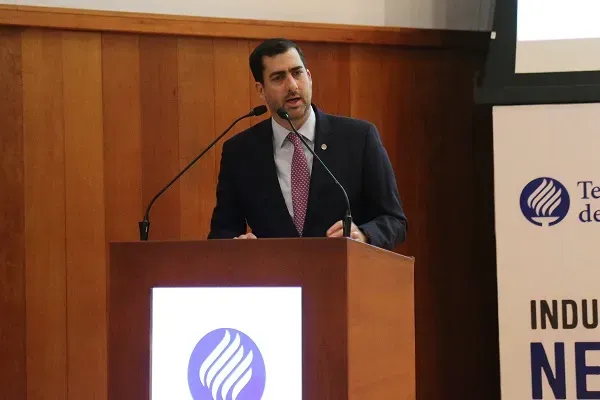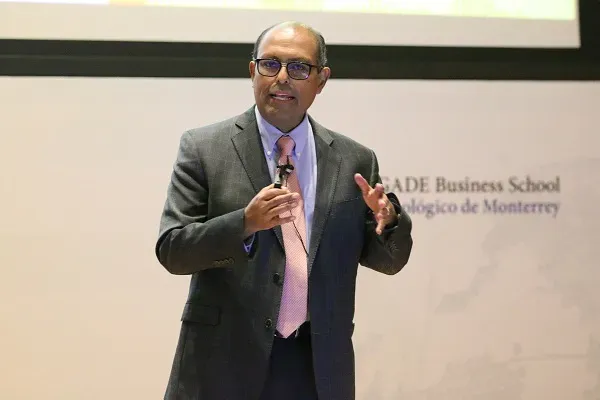A total of 76% of the FDI that comes into Mexico from nearshoring is concentrated in Nuevo León, according to a study carried out by more than 20 Tecnológico de Monterrey professors.
By INSTITUTIONAL COMMUNICATION | EGADE BUSINESS SCHOOL
Tecnológico de Monterrey presented an overview of the report “Nearshoring: Challenges and opportunities for the integration and strengthening of global value chains in Mexico” to businesspeople and industry leaders.
The factors that led to the nearshoring boom in Mexico, the prominence of its value chains and the challenge of enhancing the country’s attractiveness were the points of the study, prepared by more than 20 of the Institution’s professors, which was presented on September 25 in the auditorium of EGADE Business School, Monterrey site.

In his welcome message, Juan Pablo Murra Lascurain, rector of Higher Education at Tecnológico de Monterrey, stated: “It is important to ensure that this wave of nearshoring gives rise to a more inclusive development that will guarantee decent wages and comprise a sustainable perspective from the very beginning. We need to reflect on the kind of development we want, the public policies we hope to implement and the type of companies we want to create. This is our responsibility as an institution and as a society.”
During the event, Horacio Arredondo, dean of EGADE Business School, moderated a discussion panel, which enjoyed the participation of Gabriela Siller Pagaza, director of Economic Analysis at Grupo Financiero BASE; Eduardo Saucedo, professor at EGADE Business School; and Roberto Durán, professor at the School of Government and Public Transformation.
“Talent development is a key enabler in the context of nearshoring and plays a fundamental role in generating a lasting, positive impact on the region’s sustainable development,” Arredondo commented.

When presenting the report, Osmar Zavaleta, associate dean of Research at the School of Business and EGADE Business School, highlighted that, according to various sources, Foreign Direct Investment (FDI) in Mexico will close in 2023 at approximately over $36.7 billion dollars, while 76% of the FDI that comes into Mexico from nearshoring is concentrated in Nuevo León. By 2024, FDI would reach an estimated $37,674 million dollars.
He also mentioned that the main challenges of nearshoring include the regional diversification of export centers; articulation of value chains (north vs south, large companies vs SMEs); development of high added-value sectors; the need to invest in electrical infrastructure; water shortages in some states; a housing shortage; and mobility and pollution problems.
“Given the large investment flows, the demand for electricity will grow by an estimated 0.87% for every 1% increase in GDP,” warned Zavaleta, one of the authors of the report.
The presentation came to a close with a message from guest Iván Rivas Rodríguez, Minister of the Economy of the Nuevo León State Government: “The analysis of challenges and opportunities allows us to see where we should direct public policies. Nearshoring has favored our country given the solid guarantees for the protection of intellectual property rights, contained in Chapter 20 of the USMCA. When doing business in Mexico, investors appreciate such respect and have given us their vote of confidence, as can be seen in the deluge of foreign investment that has poured into Nuevo León. The comparative advantages with China are real, and we can offer opportunities in the country to manufacture metal products, machinery and equipment, computer equipment, electrical appliances, furniture and mattresses. One of the biggest challenges is the development of high value-added sectors through technological convergence.”
The authors of the report include professors from the School of Business and EGADE Business School, and the School of Government and Public Transformation, as well as experts from the Institution: Alfonso Avila Robinson, Carlos Mario Aldana Varga, Eduardo Armando, Eduardo Saucedo, Edgardo Arturo Ayala Gaytán, Ernesto del Castillo de la Fuente, Federico Trigos Salazar, Evodio Kaltenecker Retto de Queiroz, Francisco Javier Valderrey Villar, Javier Armando González Lozano, Jesús Emmanuel Carrillo Gallegos, Félix Cárdenas, Juan Ignacio Sánchez, Luis Vicente Cabeza Llanos, Michele Vittorio, Octavio Cabrera Lazarini, Osmar Zavaleta, Rolando Fuentes, Roberto Durán-Fernández, Roberto Garza Barbosa, René Cabral Torres, Ricardo Buitrago and Sergio Manuel Madero Gómez.
